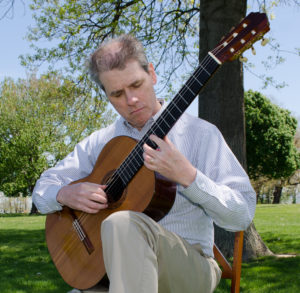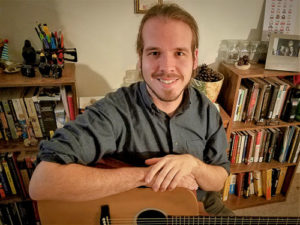 James has nearly 30 years of experience teaching guitar, with a Bachelor’s and Master’s degree in Classical Guitar Performance from the Peabody Conservatory of Johns Hopkins University. He had the honor of studying under world-renowned classical guitarist Manuel Barrueco, as well as Ray Chester, David Tanenbaum, Julian Gray, Saul Gropman, and Dr. Nels Leonard. Over his professional career, he has taught guitar at several colleges, music schools, and private schools, including Morgan State University, Gettysburg College, the Bryn Mawr School in Baltimore, and the Fine Arts Association in Willoughby. He given recitals and performances in Ohio, Maryland, California, and West Virginia, including performing as soloist with the Wheeling Symphony Orchestra. In 1999, He received a grant from Gettysburg College to research new avenues to further more ergonomically effective classical guitar technique. In addition to private instruction, he is currently the Director of Music at St. Clement Church, in Lakewood and Director of the Cleveland Guitar Orchestra of the Cleveland Classical Guitar Society.
James has nearly 30 years of experience teaching guitar, with a Bachelor’s and Master’s degree in Classical Guitar Performance from the Peabody Conservatory of Johns Hopkins University. He had the honor of studying under world-renowned classical guitarist Manuel Barrueco, as well as Ray Chester, David Tanenbaum, Julian Gray, Saul Gropman, and Dr. Nels Leonard. Over his professional career, he has taught guitar at several colleges, music schools, and private schools, including Morgan State University, Gettysburg College, the Bryn Mawr School in Baltimore, and the Fine Arts Association in Willoughby. He given recitals and performances in Ohio, Maryland, California, and West Virginia, including performing as soloist with the Wheeling Symphony Orchestra. In 1999, He received a grant from Gettysburg College to research new avenues to further more ergonomically effective classical guitar technique. In addition to private instruction, he is currently the Director of Music at St. Clement Church, in Lakewood and Director of the Cleveland Guitar Orchestra of the Cleveland Classical Guitar Society.
 Steve Miller is a diverse guitarist who loves teaching and performing. He received his Bachelor’s Degree in Music from Muskingum University where he studied guitar under Lewis Charles. While at Muskingum, Steve studied classical guitar and also played electric guitar within the Muskingum Jazz Ensemble and the student run Jazz/Rock quintet The Mighty Morphin’ Jazz Arrangers. Steve is an active performer working with the Cleveland Guitar Orchestra and gigging as a solo performer. Recently he has been working on writing and recording with his rock band, “The Paper Spoons.”
Steve Miller is a diverse guitarist who loves teaching and performing. He received his Bachelor’s Degree in Music from Muskingum University where he studied guitar under Lewis Charles. While at Muskingum, Steve studied classical guitar and also played electric guitar within the Muskingum Jazz Ensemble and the student run Jazz/Rock quintet The Mighty Morphin’ Jazz Arrangers. Steve is an active performer working with the Cleveland Guitar Orchestra and gigging as a solo performer. Recently he has been working on writing and recording with his rock band, “The Paper Spoons.”
Steve teaches improvisation and music theory and a variety of genres including jazz, blues, rock and finger style acoustic. Steve also teaches ukulele.
 Teaching Approach
Teaching Approach
We provide students the tools they need to most successfully attain their goals for the guitar, whether those goals are very modest, very ambitious, or somewhere in between. Helping students achieve what they are most enthusiastic about is what is most rewarding to us.
To help reach these goals, we give students a foundation in sound guitar technique and general musical skills, as these are both paramount to bringing out the best in the student’s potential. Trained in the Aaron Shearer tradition of classical guitar technique, James emphasizes minimizing tension to achieve greater precision, speed, fluidness, good tone, stamina, and musical sensitivity. He also teach students music reading skills with an emphasis on feeling and understanding rhythm. Good technique, reading skills, and good rhythm lay a foundation that the student can take with him or her for life, providing the tools needed for continued improvement, to better be able to take on new styles, or to do more in-depth study of music theory if interested.
Unfortunately, for whatever reason, this type of training is hard to come by in guitar instruction today. As a result, many students develop bad habits which compromise their playing, and others simply quit because the guitar seems too mysterious and overwhelming. In order to achieve the best success, students need a logical progression of skills to master step-by-step, and with expert guidance. Skipping steps or speeding through steps will only lead to “holes” in a guitarist’s overall skills.
The process of development must go at the student’s pace as the ability and the drive to master new skills will vary widely from person to person. We respect the student’s natural pacing and the student’s particular goals.
Different Styles
James Flood Guitar Lessons provides training in a plethora of styles. James teaches classical and finger style acoustic. Steve teaches jazz, rock, blues, finger-style acoustic and improvisation. Good principles of guitar technique transfer to all styles. For those styles that use a pick, students will learn how to use a pick in such a way as to maximize coordination and speed.
Optional Recitals
In June, optional informal student recitals are held for those interested. In addition to giving students a concrete goal to strive for, recitals provide performance experience and can be very rewarding.
Lessons for Children
Starting lessons early gives the individual an advantage in developing his or her fullest musical potential in music into adulthood. In addition to gaining musical skills, studies have consistently shown that learning an instrument also helps the young mind to develop in other areas such as math, reading and verbal skills.
Lessons for Children: Age 6 to 7
With parental involvement many children at this young an age can learn to play the guitar and get a head start in gaining proficiency. For students in this age group, however, reading music is frequently cumbersome and can unnecessarily delay obtaining skills on the guitar. These children will gain skills initially by learning songs through a combination of identifying note names, familiarizing themselves with melodies and rhythms as well as memorization. It is essential that the student in this age group use a size-appropriate guitar.
Lessons for Children: Age 8 to 17
This is an ideal age range for anyone to learn the guitar. These ages will benefit from having started at a younger age, enhancing their chances of achieving higher levels of skill. It is also essential also in the younger end of this age group that the student have a size appropriate instrument.
Lessons for Adults
A great bulk of our students are adults, including complete beginners and experienced players.
Lessons for Experienced Players
James has worked with many experienced guitarists over the years in many styles, including players who are at intermediate or advanced levels, and have helped them to reach a new level in their playing or expand their range of styles. Many devoted guitarists describe the experience of running into a “brick wall.” No matter how much they practice, they seem to have reached their “cap.” He especially loves to work with these devoted players and help them to achieve a level which eluded them before.